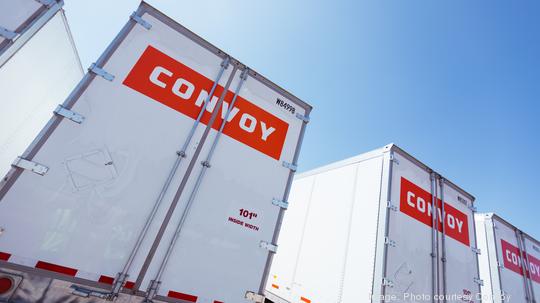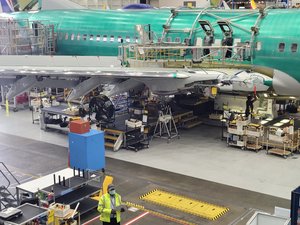
Flexport is reigniting the mission of its new high-profile trucking platform, Convoy.
After hitting a $3.8 billion valuation in 2022, Convoy battled a tough freight market that led to layoffs and, eventually, the Seattle-based startup's closure in October of last year. San Francisco-based Flexport bought the company's technology in November for an undisclosed amount, bringing on a handful of employees. Flexport relaunched Convoy's platform in February.
Now, Flexport must tangle with many of the same market forces that upended Convoy, a company that aimed to reduce emissions by cutting down the number of empty miles truckers spend driving. Experts warn the trucking industry still faces headwinds after coming down from pandemic highs.
"We went into Covid, and we had an increase in demand of people shopping from home, which put a strain or increase of demand on the ports and an increase of demand on trucking," said Craig Russell, an advisory director at KPMG. "Now what we see is a settle down. Prices are starting to come down a little bit from the oceanside. People are starting to go back out to the stores a little bit more. Once again, it's shifting and flexing."

The Convoy model, which allowed truckers to find and book loads through an app, took off during the pandemic. Now, Russell said, truckers are moving into longer-term contracts with shippers rather than the day-to-day brokerage model.
Flexport, which has offices in Bellevue, offers services in air freight, ocean freight and customs brokerage. The company declined to comment for this story.
Convoy was founded in 2015 as a way to connect shippers to trucking companies. Its clients included Unilever, The Home Depot and Anheuser-Busch. Convoy raised $260 million between equity funding and venture debt in April 2022, but the company conducted multiple rounds of layoffs after that as the freight market cooled. Its sudden closure in October led to 533 layoffs in Seattle.
Flexport has since branded Convoy as the Convoy Platform and overhauled its website. Truckers can still use the platform to find and bid on loads through an app. Flexport plans to launch a service for brokers in the second quarter. Convoy co-founder and former CEO Dan Lewis is now listed as a technical adviser to Flexport on LinkedIn.
"Today's launch of the Convoy Platform furthers Flexport's product vision to build a true one-stop-shop to ship any product," Flexport founder and CEO Ryan Petersen said in a news release when the company relaunched Convoy.
By the numbers
- $3.8B: Convoy's valuation as of April 2022
- $260M: amount Convoy raised in April 2022 between equity funding and venture debt
- 533: Seattle layoffs from Convoy's closure in October of 2023
- $1.9T: total U.S. business logistics costs in 2021, according to a report from Kearney and the Council of Supply Chain Management Professionals
- $2.3T: total U.S. business logistics costs in 2022, according to a report from Kearney and the Council of Supply Chain Management Professionals
Early investors in Convoy included Microsoft co-founder Bill Gates, Amazon founder Jeff Bezos, Salesforce CEO Marc Benioff, Uber CEO Dara Khosrowshahi and former Starbucks President Howard Behar.
According to the 2023 State of Logistics Report from the Council of Supply Chain Management Professionals and authored by consulting firm Kearney, power has shifted back into the hands of shippers after carriers held the leverage during the pandemic. The report notes that the load-to-truck ratio is the lowest it has been since June 2020 amid falling demand and rising capacity.
Total U.S. business logistics costs hit $2.3 trillion in 2022, according to the report, up from $1.9 trillion in 2021. The report notes that smaller carriers in 2022 felt pressure to either get more into contracted lanes, join with larger competitors or exit the industry altogether.
Despite the challenges facing the industry, Russell said tech will play an important role in the future of logistics, especially as autonomous vehicles break into the scene. A platform like Convoy, he added, helps level the playing field between large and small trucking companies, and it allows the best drivers to stand out.
"Even the smallest owner-operator can now see the same bid board, and you can jump in and grab a lane and execute it," Russell said.








